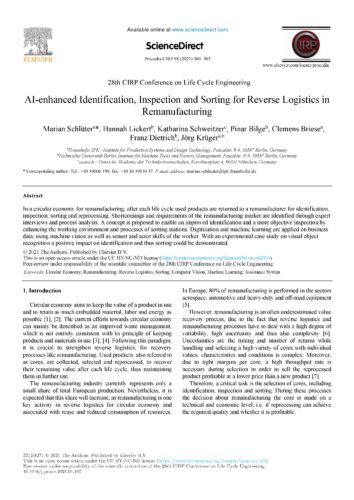EIBA – Sensory recording, automated identification and evaluation of old parts based on product data as well as information about previous deliveries
© Bosch/C-ECO
Background
The transition from a linear to a Circular Economy with the re-use of products requires an efficient collection and identification of used products. Each product is unique due to its previous history. Therefore, the clear identification and condition assessment of used parts is a high manual effort with high error rates. For example, products often look very similar to their successor models and due to missing markings the product can no longer be clearly identified. In order to facilitate identification and condition assessment, the product is to be co-evaluated by a machine with the help of artificial intelligence (AI).
Objectives
The aim of the EIBA project is to develop a machine for identifying and assessing the condition of old parts. Using AI methods such as machine learning and deep learning, the machine should be able to see and recognise products and compare them with other available information. Humans are not to be replaced by the machine, but rather supported by it.
The innovation of the project consists, among other things, in enabling cooperation between man and machine in order to potentiate their respective skills to overcome the obstacles and difficulties in sorting and assessing.
Aspects of social and ecological sustainability are consistently considered in the development of the system. It is not only the technical feasibility that determines whether AI-based systems are accepted and used in practice. The other aspects that play a role in this are being researched by acatech as part of the EIBA project. With the help of expert interviews, the project aims to find out which opportunities and challenges the introduction of AI-based systems in companies entails. In addition, the extent to which AI affects the internal organisation and how successful change management can be designed will be investigated. The results will be discussed in an expert workshop and made usable for other industrial sectors.
Preliminary results
At the "28th CIRP Conference on Life Cycle Engineering" on 12 March 2021, participants of the EIBA project presented the objectives and the working methods of the project in detail - read more in the conference documentation.
Project duration:
09/2019 — 05/2023
Chair acatech:
Prof. Dr.-Ing. Thomas Weber
acatech - National Academy for Science and Engineering
Scientific advisors:
Seda Akinci acatech Office akinci@acatech.de
Dr. Lisa Risch acatech Office risch@acatech.de









